The problem is not due to a buffer overflow, but rather that you are simply not null-terminating the wchar[] strings you are adding to the filter.
Per the std::basic_string::copy() documentation on cppreference.com:
Copies a substring [pos, pos+count) to character string pointed to by dest. If the requested substring lasts past the end of the string, or if count == npos, the copied substring is [pos, size()). The resulting character string is not null-terminated.
So, you need to add those null terminators to your strings, eg:
COMDLG_FILTERSPEC* CreateFILTERSPEC(const std::list<std::pair<std::wstring, std::wstring>> &_filters) {
COMDLG_FILTERSPEC* filterSpecs = new COMDLG_FILTERSPEC[_filters.size()];
COMDLG_FILTERSPEC* filterSpec = filterSpecs;
for (const auto &filter : _filters) {
PWSTR f1_p = new wchar_t[filter.first.length() + 1]; // <-- note the +1 !
filter.first.copy(f1_p, filter.first.length());
f1_p[filter.first.length()] = L'\0'; // <-- add this !
PWSTR f2_p = new wchar_t[filter.second.length() + 1]; // <-- note the +1 !
filter.second.copy(f2_p, filter.second.length());
f2_p[filter.second.length()] = L'\0'; // <-- add this !
filterSpec->pszName = f1_p;
filterSpec->pszSpec = f2_p;
++filterSpec;
}
return filterSpecs;
}
COMDLG_FILTERSPEC *filterSpecs = CreateFILTERSPEC(filters);
// use filterSpecs as needed ...
for(int i = 0; i < filters.size(); ++i) {
delete[] filterSpecs[i].pszName;
delete[] filterSpecs[i].pszSpec;
};
delete[] filterSpecs;
Alternatively, you can combine all of the new[]'ed memory into a single allocation for easier cleanup, eg:
COMDLG_FILTERSPEC* CreateFILTERSPEC(const std::list<std::pair<std::wstring, std::wstring>> &_filters) {
size_t size = sizeof(COMDLG_FILTERSPEC) * _filters.size();
for (const auto &filter : _filters) {
size += (filter.first.length() + filter.second.length() + 2);
}
COMDLG_FILTERSPEC* filterSpecs = reinterpret_cast<COMDLG_FILTERSPEC*>(new BYTE[size]);
COMDLG_FILTERSPEC* filterSpec = filterSpecs;
wchar_t *strData = reinterpret_cast<wchar_t*>(filterSpecs + _filters.size());
for (const auto &filter : _filters) {
filterSpec->pszName = strData;
filter.first.copy(strData, filter.first.length());
strData += filter.first.length();
*strData++ = L'\0';
filterSpec->pszSpec = strData;
filter.second.copy(strData, filter.second.length());
strData += filter.second.length();
*strData++ = L'\0';
++filterSpec;
}
return filterSpecs;
}
COMDLG_FILTERSPEC *filterSpecs = CreateFILTERSPEC(filters);
// use filterSpecs as needed ...
delete[] reinterpret_cast<BYTE*>(filterSpecs);
However, if the contents of the std::list will persist beyond the lifetime of the COMDLG_FILTERSPEC, then you don't need to new[] any memory for the strings at all, just use the existing std::wstring memory as-is, eg:
COMDLG_FILTERSPEC * CreateFILTERSPEC(const std::list<std::pair<std::wstring, std::wstring>> &_filters) {
COMDLG_FILTERSPEC* filterSpecs = new COMDLG_FILTERSPEC[_filters.size()];
COMDLG_FILTERSPEC* filterSpec = filterSpecs;
for (const auto &filter : _filters) {
filterSpec->pszName = filter.first.c_str();
filterSpec->pszSpec = filter.second.c_str();
++filterSpec;
}
return filterSpecs;
}
COMDLG_FILTERSPEC *filterSpecs = CreateFILTERSPEC(filters);
// use filterSpecs as needed ...
delete[] filterSpecs;
In which case, you should consider returning a std::unique_ptr<COMDLG_FILTERSPEC[]> rather than a raw COMDLG_FILTERSPEC* pointer, eg:
std::unique_ptr<COMDLG_FILTERSPEC[]> CreateFILTERSPEC(const std::list<std::pair<std::wstring, std::wstring>> &_filters) {
auto filterSpecs = std::make_unique<COMDLG_FILTERSPEC[]>(_filters.size());
COMDLG_FILTERSPEC* filterSpec = filterSpecs.get();
for (const auto &filter : _filters) {
filterSpec->pszName = filter.first.c_str();
filterSpec->pszSpec = filter.second.c_str();
++filterSpec;
}
return filterSpecs;
}
auto filterSpecs = CreateFILTERSPEC(filters);
// use filterSpecs.get() as needed ...
// the COMDLG_FILTERSPEC memory is freed automatically when
// filterSpecs goes out of scope...
Or, return a std::vector instead, eg:
std::vector<COMDLG_FILTERSPEC> CreateFILTERSPEC(const std::list<std::pair<std::wstring, std::wstring>> &_filters) {
std::vector<COMDLG_FILTERSPEC> filterSpecs(_filters.size());
COMDLG_FILTERSPEC* filterSpec = filterSpecs.data();
for (const auto &filter : _filters) {
filterSpec->pszName = filter.first.c_str();
filterSpec->pszSpec = filter.second.c_str();
++filterSpec;
}
return filterSpecs;
}
auto filterSpecs = CreateFILTERSPEC(filters);
// use filterSpecs.data() as needed ...
// the COMDLG_FILTERSPEC memory is freed automatically when
// filterSpecs goes out of scope...

